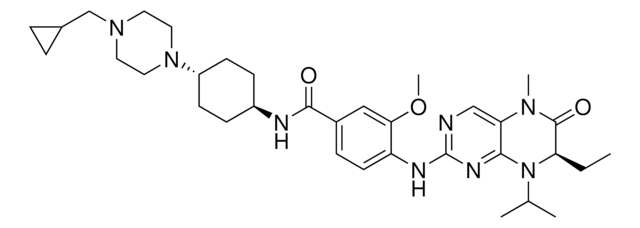SML3780
Nintedanib ethanesulphonate
≥98% (HPLC)
Synonym(s):
(3Z)-2,3-Dihydro-3-[[[4-[methyl[2-(4-methyl-1-piperazinyl)acetyl]amino]phenyl]amino]phenylmethylene]-2-oxo-1H-indole-6-carboxylic acid methyl ester, monoethanesulphonate salt, (Z)-3-[(4-{Methyl-[2-(4-methylpiperazin-1-yl)acetyl]amino}phenylamino)methylene]-2-oxo-2,3-dihydro-1H-indole-6-carboxylic acid methyl ester, monoethanesulphonate salt, BIBF 1120 esylat, BIBF-1120 esylate, BIBF1120 esylate, Methyl (Z)-3-(((4-(N-methyl-2-(4-methylpiperazin-1-yl)acetamido)phenyl)amino)(phenyl)methylene)-2-oxoindoline-6-carboxylate, monoethanesulphonate salt, Nintedanib monoethanesulphonate salt
About This Item
Recommended Products
Quality Level
Assay
≥98% (HPLC)
form
powder
storage condition
desiccated
color
white to beige
solubility
DMSO: 2 mg/mL, clear (Warmed)
storage temp.
-10 to -25°C
Biochem/physiol Actions
Caution
Signal Word
Danger
Hazard Statements
Precautionary Statements
Hazard Classifications
Aquatic Chronic 2 - Repr. 1B - STOT RE 1
Target Organs
Liver,Gastro-intestinal system
Storage Class Code
6.1C - Combustible acute toxic Cat.3 / toxic compounds or compounds which causing chronic effects
WGK
WGK 3
Flash Point(F)
Not applicable
Flash Point(C)
Not applicable
Certificates of Analysis (COA)
Search for Certificates of Analysis (COA) by entering the products Lot/Batch Number. Lot and Batch Numbers can be found on a product’s label following the words ‘Lot’ or ‘Batch’.
Already Own This Product?
Find documentation for the products that you have recently purchased in the Document Library.
Our team of scientists has experience in all areas of research including Life Science, Material Science, Chemical Synthesis, Chromatography, Analytical and many others.
Contact Technical Service









